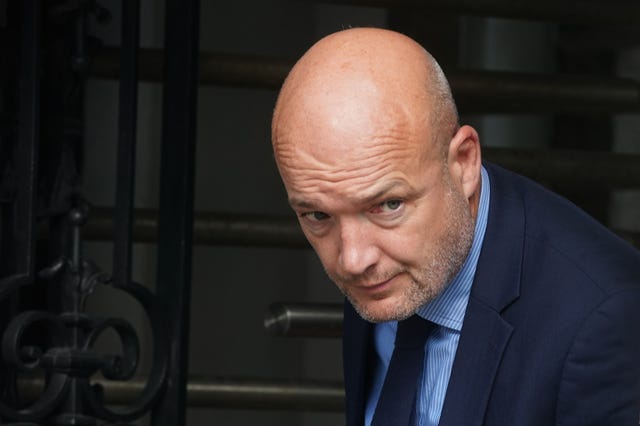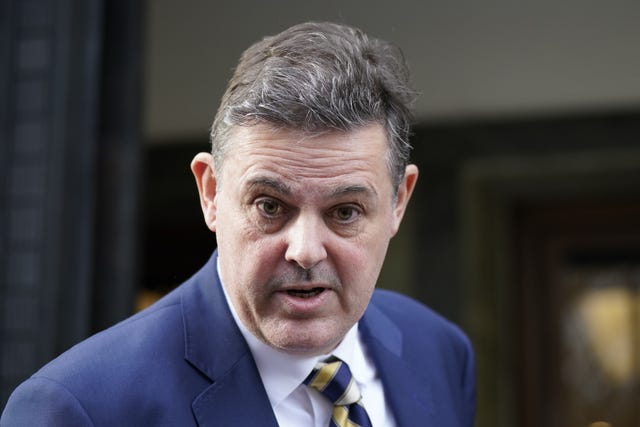Minister wants urgent meeting with RTE chair after claims she was ‘misinformed’
Catherine Martin said she was ‘deeply disappointed’ in Siun Ni Raghallaigh.

Minister for Media Catherine Martin has sought an urgent meeting with the chairwoman of the RTE board, after she said she was “misinformed” over the board’s knowledge of recent exit packages for senior executives.
Ms Martin has written to Siun Ni Raghallaigh, asking to meet her on Friday after the chairwoman repeatedly gave assurances to the minister that the board had no role in signing off the package to a former RTE chief financial officer.
Ms Martin said it has since emerged that the remuneration committee of the board, of which Ms Ni Raghallaigh is a member, approved the package for Richard Collins.
The minister told RTE’s Prime Time that she was “deeply disappointed” in Ms Ni Raghallaigh and refused to express confidence in her ahead of the meeting.

“It was my understanding that the board had no role whatsoever in the approval of these two exit packages. When I met the chair on Monday, I queried this again – was my understanding correct? – and I was assured by the chair that it was the case,” Ms Martin said.
“However, this morning, communication to my officials… it has been made known to me now that in fact, in that second exit package, that of Richard Collins, it went before the remuneration committee, so there was a process there where the board had approval.”
Ms Martin said she had been given “incorrect information” twice this week after she raised the issue with Ms Ni Raghallaigh in recent days.
The Green Party minister told the network on Thursday evening she wanted to check this information one more time on Wednesday.
“(I found) out this morning that it was the incorrect information, that it was indeed approved by the remuneration committee in which the chair sits,” Ms Martin said.
“That is of concern because the Minister for Media must be in possession of the facts of the exact information, especially in a time of crisis and controversy like this.

“I would like to say though that Siun Ni Raghallaigh has done incredible work since she come on as chair, I think, especially since this crisis erupted.
“But I do feel I need to meet Siun to just talk through exactly how this arose. How could I be misinformed on these two occasions?
“It’s not satisfactory. I’ve always said that my direct line of communication in relation to RTE is through the chair of the board. So I am deeply disappointed with this.
“I’ve written to the chair this evening, and I’ve asked to meet her tomorrow to discuss this.”
Asked several times if she has lost confidence in the chairwoman, Ms Martin replied that she was “deeply disappointed” and would not be making further comment.
Asked if she would remove Ms Ni Raghallaigh from her position as chairwoman of the board, Ms Martin said she has to “give everything consideration”, but it was “only right” that the chairwoman explains the situation.
The chairman of the Public Accounts Committee, Brian Stanley, said Ms Ni Raghallaigh’s involvement in an exit package for an RTE executive is a “most serious and grave matter”.
The Sinn Fein TD said: “What’s happened here is that you have a situation again where the minister has been misinformed.
“If that’s the case, that means the Government has been misinformed, the public has been misinformed, the people who write the cheque have been misinformed.”
Asked if he had confidence in the chairwoman of the RTE board, he told Virgin Media’s Tonight programme: “If it turns out to be the case, I think Siun Ni Raghallaigh is in trouble here.”
Mr Stanley said there was a “credibility gap” he could not overlook.
It comes hours after the director general of RTE said it is currently “completely unable” to release details of executives’ exit packages dating back to 2016.
Kevin Bakhurst said the organisation has been under pressure to release those details but said he has received legal advice that to do so would be breaking the law.
On publishing that advice, the national broadcaster confirmed that it has asked former executives to waive their right to confidentiality on their exit agreements.
It follows the revelation that former chief financial officer Breda O’Keeffe received a voluntary redundancy package worth 450,000 euros.

Mr Bakhurst has also defended a decision to give an exit payment to former strategy director Rory Coveney, who was described as the “driving force” behind a musical which accrued 2.2 million euros in losses for the broadcaster.
However, the exact amount of the payment has not been disclosed.
Advice by legal firm Arthur Cox, published by RTE on Thursday, states that both employees and former employees have a legal right that their personal data relating to their employment is not made publicly available.
“If such information is published, we remain of the view that this would contravene employees’ contractual and statutory rights thereby exposing RTE to avoidable legal challenge,” a letter dated February 21 stated.
While RTE has sent letters to eight former executives asking them to waive confidentiality themselves, Mr Bakhurst said: “I don’t want the expectations to be very high because that is entirely their gift to waive their confidentiality.”
Mr Bakhurst told Newstalk’s The Hard Shoulder: “We have to wait for their responses. But look, I want to be realistic about whether they’re likely to do it. I don’t think they are but it’s the only avenue open to me to try and see if that’s possible.
“The organisation agreed confidentiality as part of the legal settlement in many cases. So therefore, they may question why they want to do it but you know, I’ve written to see if they are prepared to do it.”
Speaking to RTE’s News At One radio programme, the director general said he would be examining “other ways of driving transparency” looking forward.

Mr Coveney, the brother of enterprise minister Simon Coveney, received a package when he resigned and his role was made redundant in July last year – the same week Mr Bakhurst took the helm.
Mr Bakhurst said RTE expects to recoup the cost of the payment to Mr Coveney by July this year.
The director general also said there were no grounds to sack Mr Coveney and that if he had taken an unfair dismissal case, he would have typically been entitled to two years’ pay.
Mr Bakhurst said, in that circumstance, RTE could potentially have been forced to pay out “double” what Mr Coveney was actually given.
These comments have contributed to speculation the payment was approximately one year’s salary, believed to be up to 200,000 euros.
When asked at the time if Mr Coveney had received an exit fee “going out the door”, Mr Bakhurst told reporters on his first day in the job that there was no “ex gratia” payment and added that it was not fair to talk about individuals.
He said: “He didn’t get a payment going out the door but he is entitled as other people are to statutory-level payments when they leave an organisation.”
Asked about the comments on Thursday, Mr Bakhurst said: “I was trying to be as accurate as I can within the realms of the confidentiality – that’s made clear here – that he deserves.”
Acknowledging his comment may have been influenced by his previous work in the UK, he said: “Statutory level would normally mean a week for every year of service, is my understanding.
“So I was trying to give an idea that he did get paid, but not an extortionate amount without giving the exact details.
“I was trying to tread a careful line between being as open as I possibly could in the circumstances but trying to respect what’s been laid out in these legal letters.”
It was put to Mr Bakhurst that a statutory redundancy payment in Ireland, which is two weeks’ pay capped at 600 euros per week for every year of service plus one bonus week, would likely be less than 20,000 euros in the case of Mr Coveney’s 16 years of service.
The director general replied: “I think that maybe that’s where I misspoke.”
It was further put that he had presented a situation where Mr Coveney was given a modest payment.
Mr Bakhurst said: “That’s not what I intended at the time.”
He also said on Thursday that while he understands why there has been a focus on Mr Coveney, he believes the attention has been “unfair”.
“He worked at RTE for 16 years, under various directors generals. He did a great job. Clearly, the Toy Show The Musical was a failure, but he was not alone in that project.
“So I was trying to be fair to him as well and also fair to his reputation and to a man who needs to go out and find another job.”

In a separate legal letter from February 21, with the subject line “certain arrangements entered into with former employees”, Arthur Cox states that the deals agreed “represented a better commercial outcome” for RTE than alternatives.
“We can confirm that these arrangements were carefully considered weighing up legal risk along with the cost, time and uncertainty surrounding alternative options.
“In our view, the terms ultimately agreed represented a better commercial outcome for RTE than the alternative options available combined with the attendant risks associated with same and fell within parameters of similar arrangements we have seen in both the private and semi-state sectors.”
In a third letter dated October 5, it acknowledges RTE’s aim for transparency, but said it is “in receipt of a number of objections and complaints expressing concerns about the potential disclosure of personal data without the consent of the employees concerned”.
“If such information is published in a manner where employees could be identified then we are of the view that this would create significant employee and industrial relations issues for RTE, as well as potentially resulting in legal exposure depending on the nature of the publication.
“The potential for such issues is borne out by correspondence RTE has received to date from concerned current and former employees.”





